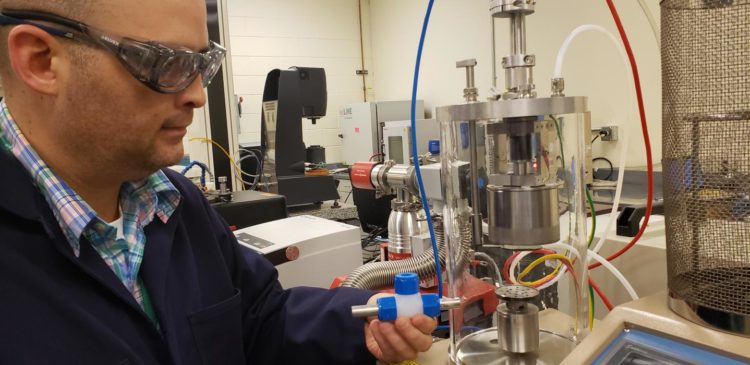
Credit: Ilias Belharouak/Oak Ridge National Laboratory, U.S. Dept. of Energy
OAK RIDGE, Tenn., Feb 5, 2020 – Energy storage startup SPARKZ Inc. has exclusively licensed five battery technologies from the Department of Energy’s Oak Ridge National Laboratory designed to eliminate cobalt metal in lithium-ion batteries. The advancement is aimed at accelerating the production of electric vehicles and energy storage solutions for the power grid.
The licensed technologies include cathode materials, a novel electrolyte formula and a scaling process that will together enable industrial scale production of more sustainable, fast-charging cobalt-free batteries.
Cobalt is a rare, costly and difficult-to-access metal that increases the performance but reduces the safety of lithium-ion batteries found in consumer electronics, such as mobile devices, and in electric vehicles, or EVs. The metal is specifically used in a battery’s cathode, the positively charged end that determines much of a battery’s performance. However, because cobalt is costly and mined overseas, finding alternative materials has become a top priority.
“Moving forward to an electrified world with millions of electric cars, cobalt is not sustainable,” said Ilias Belharouak, a group leader in ORNL’s Energy and Transportation Science Division.
Global battery demand is expected to increase to around 14 times 2018 levels of 184 gigawatt hours, or GWh, to more than 2,600 GWh in 2030, according to a report by the World Economic Forum’s Global Battery Alliance. Of that growth, the large majority is projected to take place in the mobility sector, a main focus of the licensed technologies.
“Oak Ridge National Laboratory is pleased to license this suite of advanced battery technologies to support efficient, affordable energy storage for electric vehicles,” said Moe Khaleel, associate laboratory director of ORNL’s Energy and Environmental Sciences Directorate. “Our scientists push the boundaries of what’s possible with materials science and process engineering. By working with industry partners such as SPARKZ Inc. we can help accelerate the transition of these technologies to the marketplace for the greatest societal impact.”
SPARKZ Inc. is evaluating a location for an R&D and prototyping facility in the U.S. to scale these technologies to meet the demands of customers in the mobility and grid sectors.
“We have chosen Oak Ridge National Laboratory to be our partner because ORNL provides all those functionalities which are essential to get a product rapidly to market; namely, access to the world’s best battery technologists, or human capital; access to the best technology, or intellectual capital; and access to the best infrastructure,” SPARKZ Inc. CEO Sanjiv Malhotra said.
SPARKZ Inc. licensed ORNL-developed technologies including:
- High energy density secondary lithium batteries: This high-density lithium battery design uses novel cathode and anode compositions to overcome energy density limitations of existing technologies for more efficient rechargeable batteries.
- Cobalt-free layered oxide cathodes: This low-cost, cobalt-free cathode material was created for the development of improved lithium-ion batteries.
- Nonaqueous electrolyte with lithium bis(fluorosulfonyl)imide salt for fast charging/discharging of Li-ion batteries: Electrolytes are the liquid medium by which cathodes and anodes “talk” to each other in batteries by exchanging electrons. This new electrolyte formulation allows faster charging for lithium-ion batteries and can perform at a 23% higher capacity during a 12-minute charge than other formulas.
- Early transition metal stabilized high capacity oxidatively stable cathodes of lithium-ion batteries: This innovation improves on lithium-ion cathodes by replacing early transition metals, namely cobalt, at relevant sites in cathodes, and by varying the lithium composition.
- Battery materials scale up and processes: This manufacturing innovation enables industrial-scale production of battery materials through a series of chemical processes.
“The hallmark of Oak Ridge National Laboratory’s technologies is developing low-cost, cobalt-free cathode materials without compromising on energy density,” said Jagjit Nanda, a principal investigator on several of the licensed technologies, who works in ORNL’s Chemical Sciences Division.
Energy density, or the amount of charge that a given quantity of a material holds, is especially important for EVs. Fast-charging, energy dense batteries developed by ORNL and scaled by SPARKZ could allow electric charging stations to take over as the “gas stations of the future.”
“I look at this as a very strategic partnership,” Belharouak said. “It will establish ORNL as the ‘engine’ around energy storage research in the Southeast region.”
In 2019, DOE’s Office of Energy Efficiency and Renewable Energy, Vehicle Technologies Office selected the ORNL-SPARKZ partnership for the DOE Lab Investment Incubator Activity, which focuses on maturing lab-scale technologies for commercialization.
The partnership was also selected in 2019 for a $750,000 DOE Technology Commercialization Fund project, “Enabling Cobalt-Free Battery Solution for Behind-the-Meter Storage.”
SPARKZ, Inc., was founded in 2019 by Sanjiv Malhotra, who has worked as a scientist, an entrepreneur, a venture capitalist and in the public sector, including as the first ever director of DOE’s Energy Investor Center. He founded methanol fuel cell company Oorja Protonics, Inc., in 2004, which he sold to a private equity firm in 2014.
###
DOE’s Office of Energy Efficiency and Renewable Energy, Vehicle Technologies Office supported the initial research that enabled this technology development. Inventors on the licensed technologies include Ilias Belharouak, Jagjit Nanda, Nancy Dudney, Sreekanth Pannala, Chaitanya Narula, Raymond Unocic, Surendra Martha, Marissa Wood, Chengyu Mao, Jianlin Li, Zhijia Du, David Wood, Ethan Self, Devendrasinh Darbar and Nitin Muralidharan.
For ORNL licensing information, contact http://www.
UT-Battelle manages ORNL for DOE’s Office of Science. The Office of Science is the single largest supporter of basic research in the physical sciences in the United States, and is working to address some of the most pressing challenges of our time. For more information, please visit https:/
Media Contact
Sara Shoemaker
[email protected]
865-576-9219
Original Source
https:/





